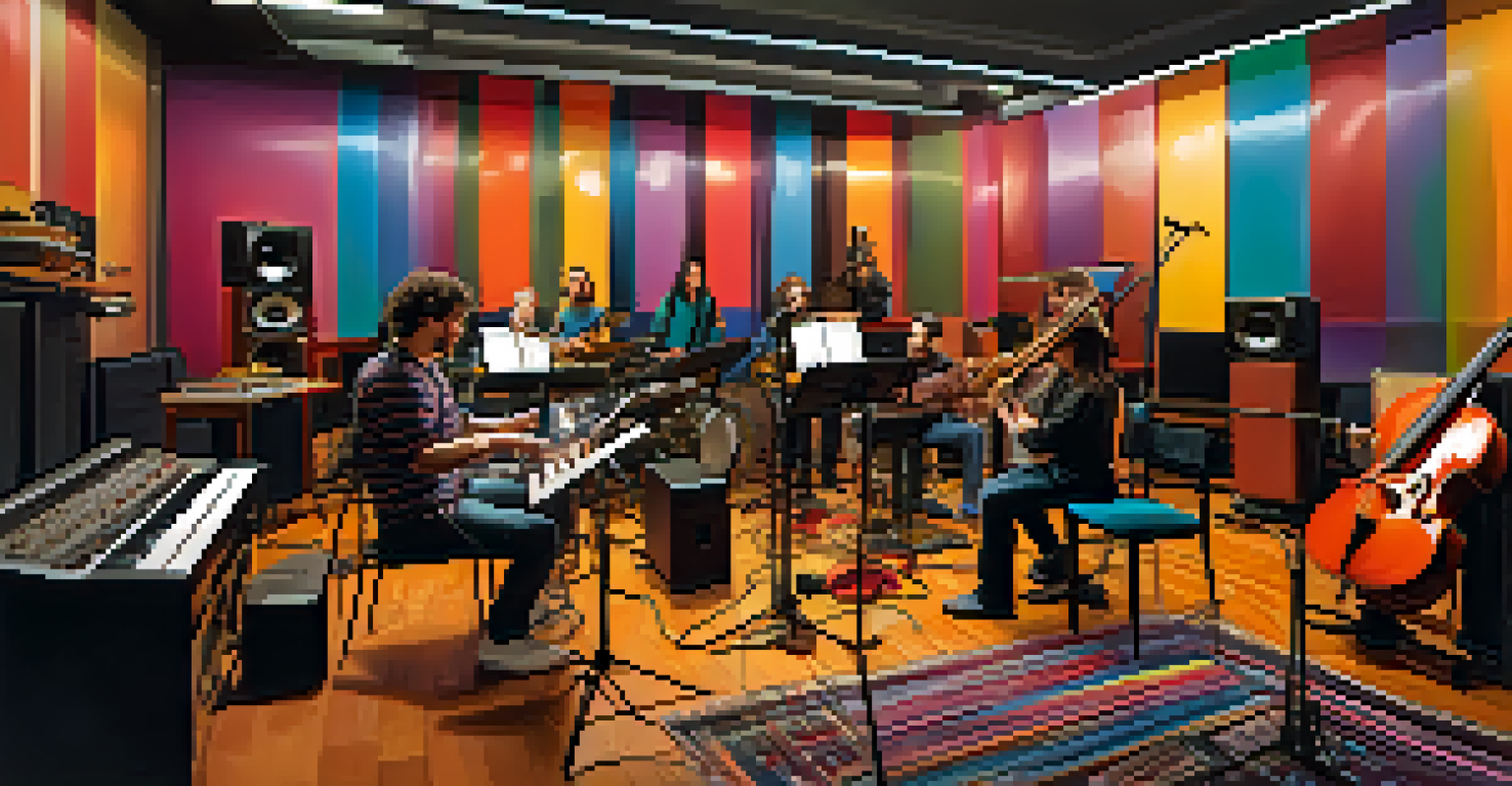The Psychological Effects of Film Music on Viewers

Film Music: The Unseen Character in Storytelling
Film music often serves as an unseen character that guides the audience's emotional journey. Just as an actor conveys feelings through performance, music enhances the narrative by evoking specific emotions. Think of a suspenseful scene where the tension builds; the accompanying music can heighten that feeling of anticipation, making viewers sit on the edge of their seats.
Music can change the world because it can change people.
This dynamic relationship between music and storytelling is crucial for creating a memorable cinematic experience. For instance, a cheerful melody can transform an ordinary moment into a joyful one, while a somber score can add depth to a tragic scene. Without this musical element, the emotional impact of a film would significantly diminish.
Moreover, composers often tailor their work to complement the visual storytelling, ensuring that the music resonates with the characters’ journeys. This synergy between visuals and sound fosters a deeper connection, allowing viewers to immerse themselves fully in the film's world.
How Music Influences Emotional Responses in Films
Music has a unique ability to elicit emotions, often more powerfully than visuals alone. For example, when you hear a heart-pounding orchestral score, your adrenaline might spike, even if you don’t see any action on screen. This phenomenon occurs because music can tap directly into our emotional centers, creating a visceral response that words or images alone might struggle to achieve.

In romantic films, gentle strings or soft piano melodies can evoke feelings of love and tenderness, making viewers more invested in the characters' relationships. On the flip side, dissonant sounds or staccato rhythms can create feelings of fear or discomfort. This emotional manipulation is a powerful tool that filmmakers wield to guide how we feel during specific moments.
Music Shapes Emotional Engagement
Film music enhances storytelling by evoking specific emotions, making audiences feel more connected to the narrative.
Furthermore, repeated exposure to certain musical themes can condition viewers to associate particular emotions with specific characters or events. This learned response can deepen the emotional impact of the narrative, ensuring that audiences are not just watching but truly feeling.
The Role of Soundtracks in Shaping Audience Expectations
A film's soundtrack plays a pivotal role in setting audience expectations before they even watch the movie. Trailers often feature carefully selected pieces of music to evoke curiosity and excitement, creating a mental framework for what viewers can anticipate. For instance, a fast-paced rock track might signal an action-packed adventure, while a haunting melody could suggest a thriller or horror film.
Without music, life would be a mistake.
This initial emotional cue prepares audiences for the tone and style of the film, influencing their engagement from the outset. When the actual film begins, the music often reinforces the established themes, creating a cohesive experience. This expectation management can enhance satisfaction when the film delivers on its promise.
Moreover, this use of soundtracks extends beyond the film itself into popular culture, where certain songs become synonymous with particular movies. Think of any iconic film, and it’s likely that the music associated with it has become part of the cultural lexicon, shaping how we remember the film long after viewing.
The Science Behind Music and Emotional Processing
Research in psychology reveals that music can significantly alter our emotional states and cognitive processing. Studies have shown that people respond to music with physiological changes, such as increased heart rate or altered breathing patterns, which can mirror the emotions depicted on screen. This biological reaction illustrates why music is such a powerful tool in filmmaking.
Furthermore, music activates brain regions associated with emotions, memory, and even motor control. This means that when we hear a familiar score, it can trigger memories of the film and the emotions we felt during it, enhancing our overall experience. This connection between music and memory is why soundtracks often evoke nostalgia, bringing back vivid memories of the films we love.
Soundtracks Set Audience Expectations
A carefully chosen soundtrack prepares viewers for the film's tone, influencing their engagement and overall experience.
Understanding this science helps filmmakers and composers create music that resonates with viewers on a deeper level. By tapping into our emotional and cognitive responses, they can craft soundtracks that not only enhance the story but also linger in our minds long after the credits roll.
Cultural Influence: How Film Music Reflects Societal Emotions
Film music is often a reflection of societal emotions and cultural trends, serving as a mirror to the times. For instance, during periods of social upheaval, film scores may adopt more dissonant or somber tones, echoing the collective anxiety felt by the public. Conversely, during more optimistic times, soundtracks might feature uplifting melodies that inspire hope and joy.
This cultural connection can help audiences relate to the film on a personal level, as the music resonates with their own experiences and emotions. For example, a film addressing themes of resilience may use powerful orchestral music to symbolize strength, making it relatable for viewers facing challenges in their own lives.
Moreover, music can also promote cultural identity, highlighting specific traditions or instruments native to a particular region. This not only enriches the storytelling but also fosters a sense of pride and connection among viewers who identify with that culture.
The Impact of Score on Audience Engagement and Retention
The right score can significantly enhance audience engagement and retention, transforming a good film into a great one. When music is effectively integrated into the narrative, it keeps viewers emotionally invested, prompting them to stay attentive to the unfolding story. For example, a character's theme might play whenever they are in danger, creating a sense of urgency that holds the audience's interest.
Additionally, music can help anchor pivotal moments in a film, making them more memorable. A powerful score during a climactic scene can leave a lasting impression, ensuring that audiences remember not just the visuals but also the emotions tied to that moment. This emotional resonance is what makes certain films unforgettable.
Cultural Reflection in Film Scores
Film music mirrors societal emotions, allowing audiences to relate personally to the themes and experiences portrayed.
As audiences increasingly consume content through streaming services, the importance of a compelling score remains paramount. With so many options available, a striking soundtrack can draw viewers back to a film, enhancing its chances of being recommended and rewatched.
Conclusion: The Lasting Effects of Film Music on Viewers
In conclusion, the psychological effects of film music on viewers are profound and far-reaching. From enhancing storytelling to shaping emotional responses, music plays a crucial role in how we experience films. It’s not just background noise; it’s an integral part of the cinematic art form that can elevate narratives and deepen connections.
As audiences, we may not always consciously recognize the impact of soundtracks on our feelings, but they undoubtedly shape our viewing experience. Whether it’s a soaring melody that inspires us or a haunting score that lingers in our minds, film music has the power to evoke a spectrum of emotions.

Ultimately, understanding the psychological effects of film music can enrich our appreciation of cinema. The next time you watch a film, pay attention to the music and consider how it enhances the story and influences your emotions, making the experience all the more engaging.